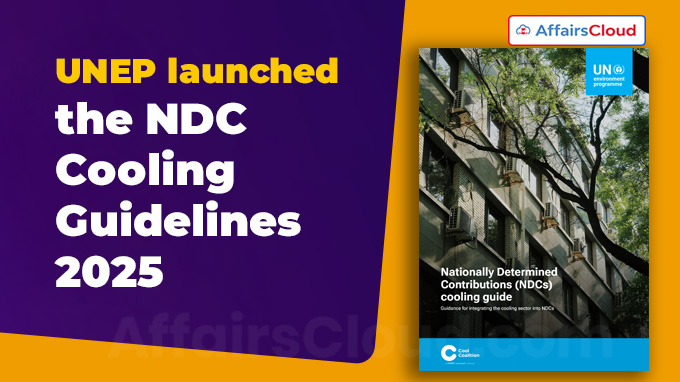 On June 23, 2025, Nairobi (Kenya) based United Nations Environment Programme (UNEP) launched the ‘Nationally Determined Contribution (NDC) Cooling Guidelines 2025’ to help countries to integrate cooling measures into both adaptation and mitigation pathways.
On June 23, 2025, Nairobi (Kenya) based United Nations Environment Programme (UNEP) launched the ‘Nationally Determined Contribution (NDC) Cooling Guidelines 2025’ to help countries to integrate cooling measures into both adaptation and mitigation pathways.
- The guidelines were launched alongside the 62nd session of the UN Framework Convention on Climate Change (UNFCCC) Subsidiary Bodies (SB 62), which took place from June 16 to 26, 2025, in Bonn, Germany.
- The event, jointly held by Cool Coalition and the Paris (France) based International Institute of Refrigeration (IIR), showcased best practices in passive cooling design, high-efficiency technologies and climate-friendly refrigerants.
About National Determined Contributions (NDCs):
i.NDCs are climate action plans, developed by individual countries under the Paris Agreement 2015, a legally binding international treaty on climate change, to reduce Greenhouse Gas (GHG) emissions and adapt to the impacts of climate change.
ii.The NDC Cooling Guidelines were developed collaboratively by the UNEP Cool Coalition NDC Working Group with contributions from the American University in Cairo; Climate and Clean Air Coalition (CCAC); Clean Cooling Collaborative (CCC); Collaborative Labelling and Appliance Standard Program (CLASP); Deutsche Gesellschaft fur Internationale Zusammenarbeit (GIZ) Proklima; the Ozone Secretariat; Sustainable Energy for All (SEforALL); United Nations Development Programme (UNDP); UNEP Copenhagen Climate Centre (UNEP-CCC); and UNEP United for Efficiency (U4E).
About NDC Cooling Guidelines 2025:
i.The NDC Cooling Guidelines offer a six-stage, step-by-step framework, supported by country case studies, to help policymakers assess hydrofluorocarbons (HFCs) and energy-related emissions, set sector-specific targets, and develop fully costed National Cooling Action Plans (NCAPs).
ii.The goal is to reduce emissions from cooling, which currently account for about 7% of global GHG, by nearly 60% by 2050.
iii.The guidelines emphasize Minimum Energy Performance Standards (MEPS), Kigali-compliant refrigerant phase-down, passive and nature-based solutions, as well as climate-responsive urban planning.
iii.These actions are underpinned by cross-ministerial coordination, a robust Measurement, Reporting, and Verification (MRV) system to track progress, and a strong focus on expanding equitable access.
iv.The guide provides country case studies that share their strategies, such as
- Nigeria, integrated its NCAP into its NDCs, focusing on heat-resilient infrastructure and expanding energy access in rural areas.
- Grenada’s work towards becoming the first HFC free nation through initiatives, focused on technician training and refrigerant recycling.
v.The case study includes United Arab Emirates (UAE), which has embedded cooling considerations across multiple sectors, prioritizing district cooling and energy-efficient Air Conditioning(AC) to reduce emissions.
- These case studies demonstrate the potential for context-specific strategies, supported by strong stakeholder collaboration, to achieve significant and measurable outcomes.
National Cooling Action Plans (NCAPs) in India:
i.NCAP is an initiative launched by the Government of India (GoI) to address the rapidly growing demand for cooling in a sustainable and climate-friendly method.
ii.It was launched on 8th March in 2019 by the Ministry of Environment, Forest and Climate Change (MoEFCC).
- With this, India became the first country to develop a NCAP.
Keyfacts:
i.Cooling currently accounts for 7% of global GHG emissions, and this share could rise to over 10% by 2050.
ii.Around 1.1 billion people still lack access to cooling, putting their health, food security, and lives at risk.
iii.Globally, cooling consumes about 20% of electricity used in buildings and more than 50% in buildings in the United Arab Emirates(UAE).
About United Nations Environment Programme (UNEP):
Executive Director (ED) – Inger Anderson
Headquarters – Nairobi, Kenya
Established – 1972




